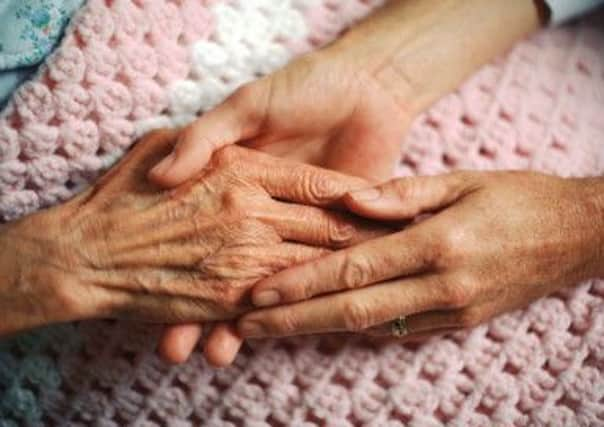Jayne Dowle: Silent army anyone may be called up to join


What about that little boy with the pale face, searching through the supermarket bargains at the end of the day? Could he really be one? Every one of them could be, because carers don’t wear a badge.
You will find them in every village, town and city. You can’t pick them out by the clothes they wear, their accents or their social background. Carers don’t immediately stand out from the crowd. They don’t, as a rule, march through the streets demanding better rights. With all their responsibilities, they don’t have the energy to shout up and make a fuss.
Advertisement
Hide AdAdvertisement
Hide AdHalf the time, they don’t even realise that they have become “a carer” until someone stops them in their hurried tracks and reminds them that’s what they do. That’s if anyone notices at all. New research, produced for the awareness campaign Carers Week – taking place until June 16 – reminds us that carers are under-valued and taken for granted.
Whether it’s that mother of school-age children with a terminally-ill husband at home, the young man trying to help his house-bound grandfather claim for his heating bill, or that little boy looking after his disabled mother alone, carers are let down woefully by a lack of official recognition and support.
More than 80 per cent of those surveyed said that they were not aware of all the help available for them. Nearly half said that they had had to give up work because of their responsibilities. And almost all admitted that they felt more stressed.
Apart from the endless juggling of priorities and exhausting hours, the biggest problem facing carers is that they are no one’s problem. They are a silent army. The jobs they do would cost millions in a professional setting, yet no one government body, social or medical service takes overall responsibility for their work and well-being.
Advertisement
Hide AdAdvertisement
Hide AdAnd we all have to face the prospect of joining their ranks. Every day in the UK 6,000 people take on new caring demands. There is a strong probability that if you are not already a carer yourself, you will become one at some point in your life. And it can happen overnight.
One minute your widowed 70-something mother is fit and well, the next she has fallen and broken her hip. The cycle this kicks off is swift and often cruel. Your only sister lives in Scotland. The neighbours are at work all day. When she comes home from hospital, there is no one to look after her but you.
Your mother, once so strong and proud, is afraid to be left alone, but doesn’t want strangers in the house seeing to her every need.
Before you know it, you’re popping in every morning and evening to check she is OK. Before you know it you’re cooking her meals, bathing her, sleeping fitfully with the phone under your pillow, just in case. Before you know it, your own life is on hold, while you dedicate yourself to her well-being. Your own mental, emotional and physical health is ignored. Your other relationships suffer. Who notices though? Who gives you any respect or recognition for what you do?
Advertisement
Hide AdAdvertisement
Hide AdHow anyone can criticise such dedicated carers is beyond me. I was once in a queue at the post office and heard a well-dressed middle-aged man moaning about the easy lives of those who give up work to look after elderly parents. I kept my mouth shut then, but I wished I hadn’t.
So here’s my delayed response. Yes, it is true that there have always been carers. And yes, I can see how some selfish people might think, from their lofty position of financial security and robust health, that there is no need to make them a special case.
Carers are a special case though, and the modern world itself has turned them into the lynchpins they have become. Every case of caring is different, but in general, we live in a world where people live longer than ever before. And those with chronic conditions or disabilities, who might have once been cared for long-term in hospital or an institution, now survive for years on medication at home. Someone has to look after them. However, the family and community support which existed in the past may be fractured or non-existent. Professional care can be limited, or prohibitively expensive. All too often, all the responsibilities come down to one person.
One day, you could find you have become that person. And one day, you could become a person who needs someone to care for you in return. Who will be there then? What help – if any – will they get?
Advertisement
Hide AdAdvertisement
Hide AdThis is why we should all support everything that Carers Week calls for, from better public understanding and recognition of carers, to flexible working practices and reliable welfare advice. Their demands are not for the benefit of others, they are for the potential benefit of us all.